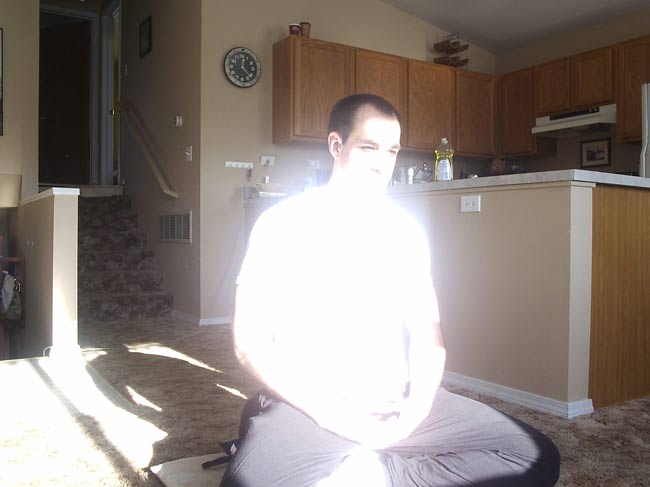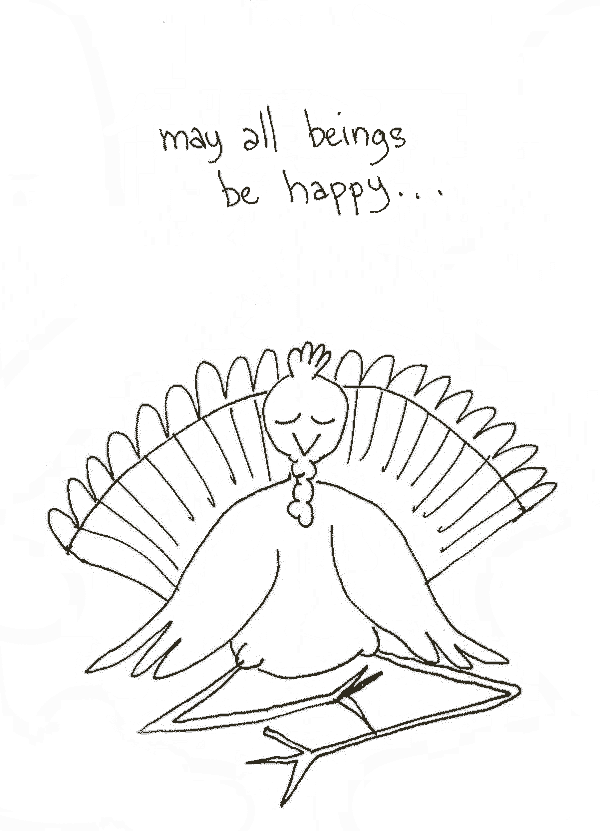 I’ve been working on a reading group with friends lately, covering Matthieu Ricard’s book, “Happiness: A Guide to Developing Life’s Most Important Skill.” Unfortunately summer’s heat and attractive alternatives seem to be taking their toll and attendance is spotty at best. It’s a trend across the board, I visited the FWBO center here a month or so ago and it was relatively dormant, and I missed Sunday teachings (in my own house!) this week – sleeping off the half marathon – only to hear that only one student came then. ‘Tis hard to meditate in this heat, easy to flock to the river or just curl up in some cool nook and read.
I’ve been working on a reading group with friends lately, covering Matthieu Ricard’s book, “Happiness: A Guide to Developing Life’s Most Important Skill.” Unfortunately summer’s heat and attractive alternatives seem to be taking their toll and attendance is spotty at best. It’s a trend across the board, I visited the FWBO center here a month or so ago and it was relatively dormant, and I missed Sunday teachings (in my own house!) this week – sleeping off the half marathon – only to hear that only one student came then. ‘Tis hard to meditate in this heat, easy to flock to the river or just curl up in some cool nook and read.
Last week’s scheduled readings covered chapters four and five, “False Friends” and “Is Happiness Possible?” In “False Friends” Ricard begins by working hard to teach us to distinguish between pleasures and real happiness. He describes the ‘fleeting nature’ and instability of pleasure, and points out that some pleasures, such as food and warmth, can easily become disgusting or destructive when we blindly eat too much or get too close to a flame. However, this isn’t to say that pleasures are inherently bad, only that they can distract us, lead us into obsessions and ultimately delusion regarding the true nature of reality. Regarding intimate relationships, he states poignantly,
In sexual intimacy there can certainly be mutual pleasure through giving and receiving pleasurable sensations, but such pleasure can transcend the self and contribute to genuine happiness only if the very nature of mutuality and generous altruism lies at its core. (p.41)
That core of mutuality and altruism must spring from something deep within, it lies at an entirely different level from good times, laughter, and pleasurable sensations. True altruism results from the heart of one person opening to the open heart of another. And to open one’s heart takes training in compassion and wisdom (with the full list of paramitas/virtues in support: generosity, ethical living, patience, energy, meditation, and wisdom). Such an openness comes naturally with authentic happiness, which, as Ricard describes, “is not linked to an activity; it is a state of being, a profound emotional balance struck by a subtle understanding of how the mind functions.”
The result of authentic happiness is a sort of radiance of peace for oneself and others, both in good and difficult times. While many people ride the roller-coaster of pleasure and suffering, often to their admitted dismay, the authentically happy person finds rich enjoyment and meaning in each moment of life. Addressing the “Live it Up!” philosophy of many people today, Ricard suggests that, “A genuine sense of fulfillment, associated with inner freedom, can also offer intensity to every living moment, but of an altogether different sort.” The difficulty to me is that people caught up in the ups and downs of a superficial life seem so blind to the intense joy radiating from those with deep fulfillment, the Thomas Mertons and Dalai Lamas of the world. It saddens me to see that blindness, and to hear their belief that this is as good as it gets.
I suppose that is where all of us who have tasted genuine fulfillment at one time or another come in: to live, really live, as beacons of the joy which springs from delicately touching the depths of one’s own heart, and allowing others to do likewise. But it is hard, for me at least, to really open my heart to such people (except in isolated, one on one circumstances) because often enough my heart does react with sadness. Perhaps that is my practice now, to further cultivate the contemplative’s inner glow in hope of cutting through the veils of ignorance in others (not to mention my own!).
Speaking of
cultivating inner glow (and moving into the properly
lighthearted spirit of ‘happiness’),
here’s a photo of me from a couple years back (when I was reading lots of Hegel and really about to become a bodhisattva):
And, in the spirit of blogs past (Thanksgiving ’05):

 I’ve been working on a reading group with friends lately, covering Matthieu Ricard’s book, “Happiness: A Guide to Developing Life’s Most Important Skill.” Unfortunately summer’s heat and attractive alternatives seem to be taking their toll and attendance is spotty at best. It’s a trend across the board, I visited the FWBO center here a month or so ago and it was relatively dormant, and I missed Sunday teachings (in my own house!) this week – sleeping off the half marathon – only to hear that only one student came then. ‘Tis hard to meditate in this heat, easy to flock to the river or just curl up in some cool nook and read.
I’ve been working on a reading group with friends lately, covering Matthieu Ricard’s book, “Happiness: A Guide to Developing Life’s Most Important Skill.” Unfortunately summer’s heat and attractive alternatives seem to be taking their toll and attendance is spotty at best. It’s a trend across the board, I visited the FWBO center here a month or so ago and it was relatively dormant, and I missed Sunday teachings (in my own house!) this week – sleeping off the half marathon – only to hear that only one student came then. ‘Tis hard to meditate in this heat, easy to flock to the river or just curl up in some cool nook and read.












